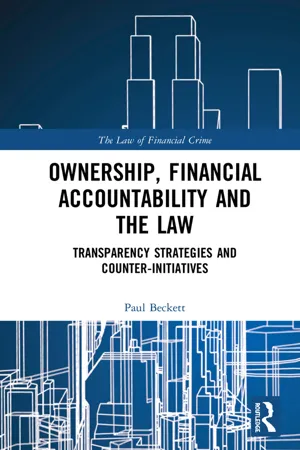
Ownership, Financial Accountability and the Law
Transparency Strategies and Counter-Initiatives
Paul Beckett
- 268 pagine
- English
- ePUB (disponibile sull'app)
- Disponibile su iOS e Android
Ownership, Financial Accountability and the Law
Transparency Strategies and Counter-Initiatives
Paul Beckett
Informazioni sul libro
There is something visceral about ownership. This is mine; you can't have it. This is mine; you can share it. This is ours. Try to find it.
Contemporary literature and investigative journalism are showing that the scale of the problem of tax evasion, money laundering, organised crime, terrorism, bribery, corruption and gross human rights abuses is vast.
Ownership – specifically, the quest to identify beneficial owners - has been chosen by national and international regulators as the touchstone, the litmus test in the fight back. An owner by definition must possess something for which they are financially accountable. But what is meant by " ownership "? This book explains why ownership is pivotal to accountability, and what ownership means in common law, civil law and Shariah law terms. It looks in detail at State, regional and international transparency strategies and at an equally powerful global private counter-initiative to promote beneficial ownership avoidance through the use of so-called " orphan structures ". Where there is no owner, there is no accountability. The distinction between privacy and legitimate confidentiality on the one hand, and concealment on the other is explained with reference to commercial and trade law and practice, principles of corporate governance and applicable business human rights. This book introduces one further counter initiative: the phenomenon of transient ownership made possible through the use of cryptocurrency and the blockchain. The study concludes with a blueprint for action with recommendations addressed to states, international organisations, practitioners and other stakeholders.